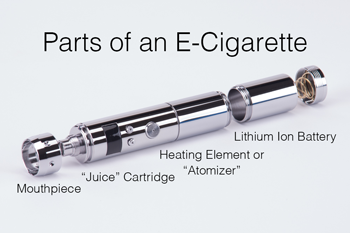E-Cigarettes Under Fire For Causing Fires
Three people are suing the makers and sellers of popular e-cigarettes. In separate lawsuits filed today, the plaintiffs all claim to have suffered severe burns due to their devices exploding.
Listen to the audio story here.
Attorney Gregory L. Bentley, of Schernoff, Bidart, Echeverria and Bentley, represents the three plaintiffs, Vicente Garza, Daniel Califf and Gregory Phillips, Jr. While their suits are separate, each has a similar claim. All three plaintiffs allege their e-cigarettes exploded either in their hands or pockets, resulting in serious injuries. Garza's index finger had to be amputated from the knuckle down after sustaining severe burns.

E-cigarettes, or e-cigs, have grown in popularity recently as an alternative to traditional cigarettes, and are heralded by many as safer, and even as a tool to help smokers quit cigarettes altogether. In fact, a BioMed Central Public Health study found that “the use of e-Cigarette substantially decreased cigarette consumption without causing significant side effects in smokers not intending to quit.”
But the flip side to this news is that very little is known about the long-term effects of “vaping,” or smoking, e-cigarettes. Because of this, there is very little regulation on the vaping industry. Unlike cigarettes and traditional tobacco products, e-cigs are not required to come with a surgeon general’s warning, nor are they prohibited from advertising on television.
A FEMA report cited by Bentley claimed to find only 25 incidents of exploding e-cigs over a period of five years from 2009-2014. However, Bentley acknowledged that figure may be somewhat inaccurate do to a lack of reporting. FEMA states “This list is not thought to be all-inclusive since it is likely that there were incidents that were not reported to the fire department and/or reported in the media.”
The same report backed up Bentley’s claim that lithium-ion battery failure was thought to be the cause of many of these explosions. It also states that 80% of incidents reported happened while the battery was being charged. Similar incidents of lithium-ion battery failure have been reported in devices such as smart phones, so the problem is not limited to e-cigarettes.

On top of winning damages for his clients, Bentley hopes these lawsuits affect the status of regulation as it applies to e-cigarettes. However, since many of the products are manufactured overseas, particularly in China, holding companies accountable is difficult.
According to FEMA, “since there are no apparent standards directly applicable to e-cigarettes, the selection of protection for the lithium-ion battery is left to the manufacturers’ best judgment. The fact that, statistically, so few of these devices are failing in the ways described by the media reports suggests strongly that e-cigarette manufacturers have been largely successful in preventing battery fires.”
Others have mixed feelings on the possibility of regulation. “It would hurt a lot of juice manufacturers, but… you know that there would be quality in the e-cig you would be using,” says product manager Wren Reyes of The Vape Shop in Los Angeles.
Reyes says that many users are simply uneducated when it comes to understanding the dangers of e-cigs, and that many of his customers come from other stores where they were not taught how to properly use and care for their product. It may be that some of these incidents come from human error.
The FDA currently only regulates e-cigarettes that are marketed for therapeutic reasons. Until more is known on the long-term effects, vaping may continue to go unregulated.
Reach Contributor David Merrell or follow him on Twitter here.










